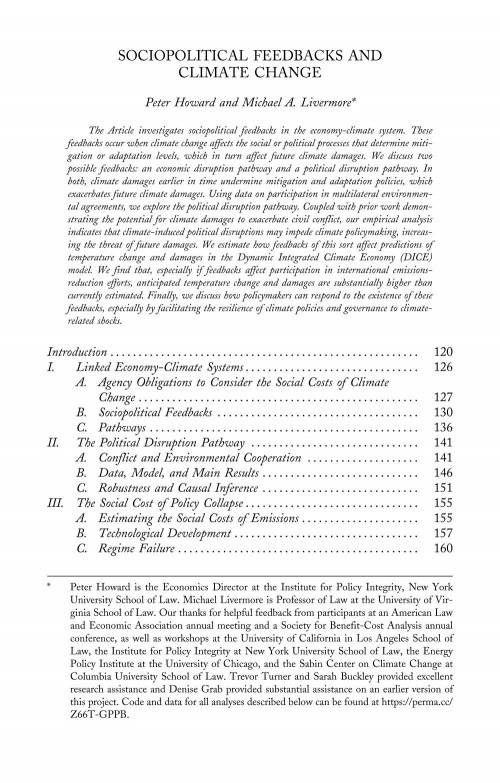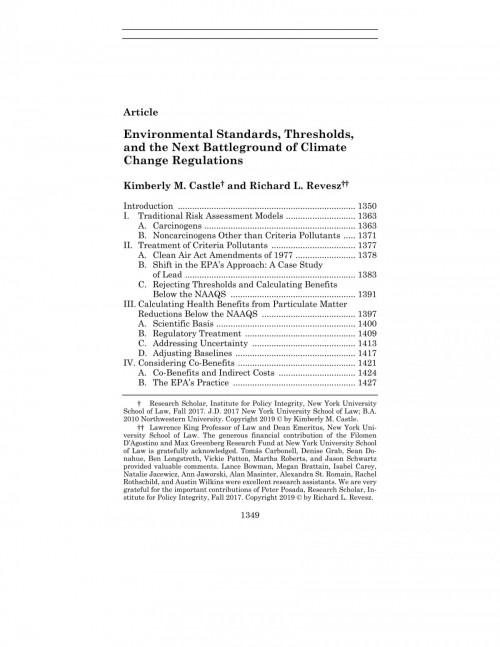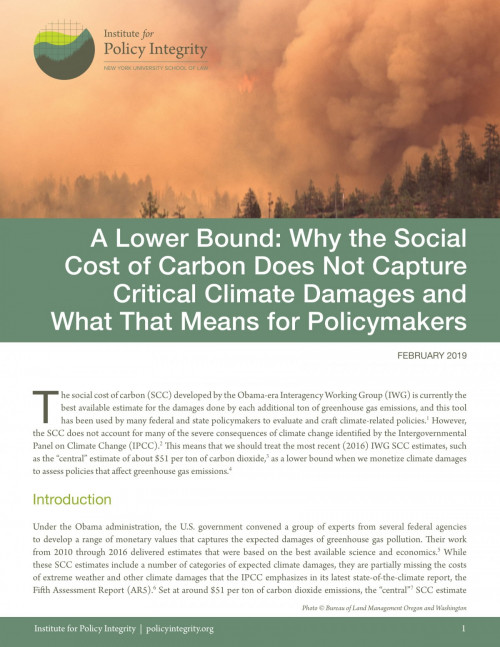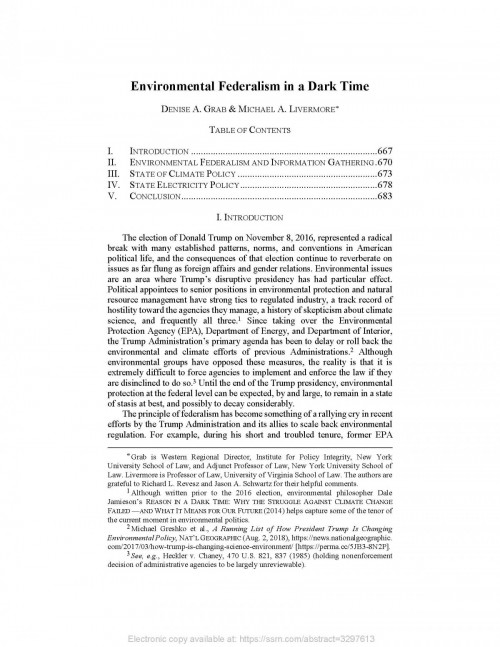-
New Tracking Resource: Health and Environmental Benefits Threatened by Deregulation
Our new tracking resource tallies the benefits to public health and the environment that are at risk due to regulatory repeals, delays, and revisions. Since 2017, numerous environmental rules have been the subject of the Trump administration’s deregulatory agenda. The original rules highlighted in our document were economically justified, meaning each was supported by a detailed account of its monetized benefits to the American public, which outweighed projected costs. Now, as the administration works to undo these rules, a wide range of crucial benefits could be lost. Our resource provides information on the kinds of benefits at risk, monetized gross and net benefit estimates, and other unquantified health and environmental effects of several federal rules.
-

Sociopolitical Feedbacks and Climate Change
This article, published in the Harvard Environmental Law Review, investigates sociopolitical feedbacks in the economy-climate system. These feedbacks occur when climate change affects the social or political processes that determine mitigation or adaptation levels, which in turn affect future climate damages. Two possible feedbacks are an economic disruption pathway and a political disruption pathway. In both, climate damages earlier in time undermine mitigation and adaptation policies, which exacerbates future climate damages. Using data on participation in multilateral environmental agreements, the article explores the political disruption pathway.
-

Environmental Standards, Thresholds, and the Next Battleground of Climate Change Regulations
This article, published in the Minnesota Law Review, addresses a central battleground of the debate about the future of greenhouse gas regulations: the valuation of particulate matter reductions that accompany reductions in carbon dioxide emissions. The benefits from particulate matter reductions are substantial for climate change rules, accounting for almost one half of the quantified benefits of the Obama Administration’s Clean Power Plan. These benefits are also significant for regulations of other air pollutants, making this issue one of far-reaching importance for the future of environmental protection.
-
Comments on New Jersey Rejoining the Regional Greenhouse Gas Initiative
New Jersey is proposing a new state carbon emissions trading program, which means it will rejoin the Regional Greenhouse Gas Initiative (RGGI). RGGI is a cooperative effort among northeastern states to reduce carbon emissions from the electric power sector through allowance trading. New Jersey previously left the initiative in 2011. RGGI expansion promises several benefits, such as improved market efficiency, increased competitiveness, and lower carbon reduction costs. We submitted comments to both RGGI and New Jersey on how to best reintegrate the state.
-
Comments to FERC on Adelphia Gateway Pipeline Project
The Federal Energy Regulatory Commission (FERC) recently released an Environmental Assessment (EA) for the Adelphia Gateway Project. FERC quantifies nearly 90,000 tons per year of direct carbon dioxide-equivalent emissions, but offers no meaningful analysis of the pipeline’s climate impacts. We submitted joint comments urging FERC to better weigh the significance of project’s impacts using the social cost of greenhouse gases methodology.
-
Comments to FERC on Annova Natural Gas Project
In the Federal Energy Regulatory Commission’s (FERC) Environmental Impact Statement (EIS) for the Annova LNG Brownsville Project, the agency quantifies over 350,000 tons per year of direct operational carbon dioxide-equivalent emissions from the proposed natural gas terminal. But FERC fails to provide meaningful analysis of the resulting climate impacts. We submitted joint comments urging FERC to better contextualize the project’s impacts using the social cost of greenhouse gases methodology.
-

A Lower Bound
Why the Social Cost of Carbon Does Not Capture Critical Climate Damages and What That Means for Policymakers
The Social Cost of Carbon, developed by the Obama-era Interagency Working Group (IWG), is the best available tool for measuring the economic damages from greenhouse gas emissions. It has been used in analysis for over 100 federal regulations that affect greenhouse gas emissions, as well as by a number of states in electricity and climate policy. Still, many significant impacts identified by the Intergovernmental Panel on Climate Change are difficult to quantify and so have been omitted from the IWG SCC estimates. Impacts such as increased fire risk, slower economic growth, and large-scale migration are all unaccounted for, despite their potential to cause large economic losses. Our new issue brief discusses these omissions and other variables that will influence climate outcomes. We encourage policymakers to account for this likely underestimate by viewing the SCC as a lower bound for damages.
-
Amicus Brief on Climate Impacts of the PennEast Pipeline Project
In January, the Federal Energy Regulatory Commission (FERC) authorized the construction and operation of the PennEast Pipeline Project, a 116-mile natural gas pipeline between Pennsylvania and New Jersey and associated facilities. FERC’s Environmental Impact Statement (EIS) showed that the project will result in an increase in greenhouse gas emissions but did little more than quantify those emissions, failing to fully analyze and consider the climate impacts of the project. We submitted an amicus brief to the U.S. Court of Appeals for the District of Columbia Circuit that demonstrates how FERC could have used the Social Cost of Carbon to analyze the pipeline’s climate impacts.
-
Supplemental Comments to NHTSA and EPA on Vehicle Emissions Standards
In October, we submitted comments to the National Highway Traffic Safety Administration (NHTSA) and Environmental Protection Agency (EPA) critiquing the proposed Safer Affordable Fuel-Efficient Vehicles Rule. We now have also submitted supplemental comments rebutting an analysis, prepared by NERA Economic Consulting and Trinity Consultants and submitted by the Alliance of Automobile Manufacturers, in support of the proposed rule.
-

Environmental Federalism in a Dark Time
The principle of federalism has become something of a rallying cry in recent efforts by the Trump Administration and its allies to scale back environmental regulation. For example, during his short and troubled tenure, former EPA Administrator Scott Pruitt argued that the federal government has become too intrusive and that states should be returned to a position of “regulatory primacy” on environmental matters. Some states have responded to the impeding federal retreat by forging ahead. For example, California has continued to take aggressive steps to curb greenhouse gas emissions, and has even taken steps to project its influence internationally. However, despite these hopeful signs of resistance, the net effect of the Trump Administration’s efforts to scale back federal environmental policy is likely to undermine rather than energize state environmental policymaking, especially in Republican-dominated and swing states, where the climate policy vacuum is most acute.
Viewing recent projects in Climate and Energy Policy





